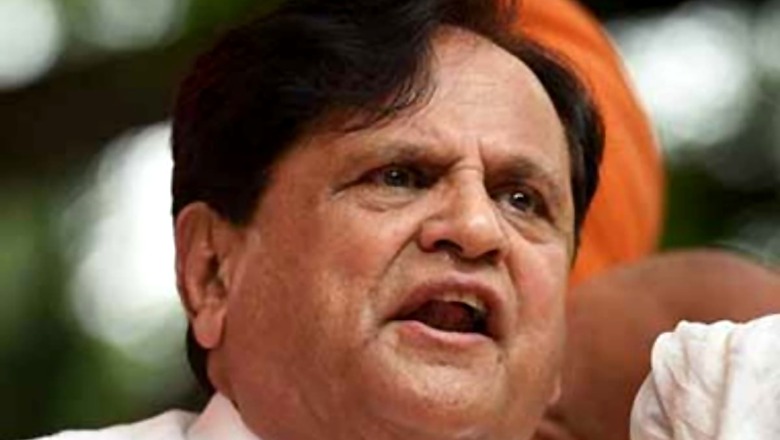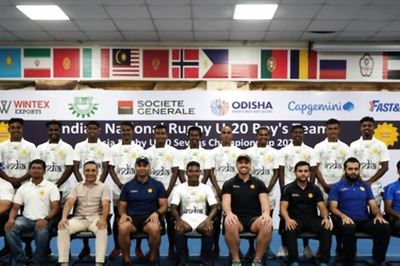
views
It is said that the exit of Nizam ul Mulk from Emperor Mohammad Shah’s court hastened the disintegration of the mighty Mughals. The death of Ahmedbhai Mohammadbhai Patel today stares hard at the grand old party with fears of fragmentation getting real and immediate. His absence will be felt most when the Congress and Gandhis are struggling to keep a united face of the party. There is every possibility now that the disgruntled Congress leaders – G 23 and some regional satraps, would get more vocal, pro-active and contemplate life beyond the existing ecosystem.
In her condolence message, Sonia Gandhi has aptly described him as an “irreplaceable comrade” as both she and her son Rahul Gandhi would sorely miss him on all occasions to come.
Backed to the hilt by Sonia Gandhi, Ahmed Patel, aka Bhai, had remained a go-to person for almost two decades. A telephone call from him to any chief minister of a Congress-ruled state would make a Captain, Ashok or Narayanswamy say whatever the Congress high command wished to hear or execute. Ditto was the case with the leaders of non-BJP political parties, corporate world, media houses, religious heads and NGOs. In the process, many compromises had to be made but on most occasions, workable solutions prevented things from getting unsavory. Over the years, Patel had developed a huge stock of “I owe you” vouchers from virtually every walk of life; he seldom exchanged them.
The charge against the departed soul had been lack of killer instincts. It is part of the Congress folklore that Ahmed Patel had vetoed aggressive –legal and political moves, against the then Gujarat chief minister Narendra Modi over the 2002 riots. While some legal eagles in the Congress and few ministers in Manmohan Singh-led UPA had advocated a stronger line against Modi in 2004, Patel reportedly convinced Sonia and Manmohan to let the ‘law take its own course.’ A minuscule section of the Congress grudged that against Patel but the parliamentarian from Bharuch remained convinced till the end that the move would have been counter-productive and hampered the smooth sailing of Congress-led UPA for 10 long years.
It was not that Patel had any soft spot for the BJP or the Sangh parivar. In fact, he had suffered most from them. Until 1989-91, when Gujarat saw unprecedented rise of the Vishwa Hindu Parishad in the wake of Ramjanambhomi movement, Patel was represented three times as Lok Sabha member from Bharuch in 1977, 1980 and 1984. However, he lost the 1989 Lok Sabha election due to a sustained communal campaign against him. Patel was a popular figure who was locally addressed as ‘Babu Bhai.’
The VHP reportedly changed his name from Babu Bhai to ‘Ahmed’ in every wall-graffiti, poster, banner to emphasise on his religious identity. Patel lost by 18,909 votes and painfully described his electoral loss as a “a defeat of secularism rather than mine.” He used to be the only Muslim Lok Sabha member from Gujarat.
Having lost relevance in electoral politics did not disheartened Patel. As he entered Rajya Sabha in 1993, Patel developed a comfort level with then Prime Minister P.V. Narasimha Rao who was having a lot of functional problems with 10, Janpath. Rao used him as an effective backroom channel of communication with Sonia, a ploy that even Sitaram Kesri employed during his stint as the Congress president. In this sense, post Rajiv Gandhi era, each time a new Congress president took over, Patel became a central piece. By the time Rahul Gandhi took over as 87th AICC chief in December 2017, some of his contemporaries used to privately say, “New CP (Congress president) same AP” (Ahmad Patel).
During the UPA years, Patel was the fourth-most powerful man in the establishment after Sonia, then Prime Minister Manmohan Singh and senior minister Pranab Mukherjee. In the party, Patel was seen as a bridge between the old guard and those who claim proximity to Rahul. It would not be an exaggeration to say that there is not a single state in the country where Patel is not personally known to the majority of district-level Congress functionaries and elected representatives.
Unlike many other Congress leaders, Patel has never tried to become a central minister. He has seldom occupied a room at 24, Akbar Road, the party’s national headquarters in New Delhi, preferring to operate from his residence at 23, Mother Teresa Marg.
In Lutyens Delhi, 23 Mother Teresa Marg was considered a power centre. Access to Patel’s house was highly restricted. Multiple entry and exit doors, chambers and seating arrangements reveal the pecking order of the visitors where the fate of Congress chief ministers and state party functionaries and candidates for elections, from Parliament to civic bodies, were often decided.
Getting an appointment with Patel was not easy unless one gets a call from the landline number giving a late-night slot. Ticket-seekers are known to have tracked Patel to various places, including mosques where he offered Friday prayers. At one point, Patel had to change mosques every week to escape those seeking favours. A god-fearing person who performed Hajj in 2011, Patel is not known to miss praying five times a day, Ramazan fasts or daily morning recitations of the Quran.
Since 2014, Patel had been looking for retirement from active politics but every time he had broached the subject, Sonia had summarily rejected it on the ground that as a loyalist he had no choice but to accept the “high command’s” diktat. In recent times, I had asked him to consider writing his memoirs having seen so many momentous events and been privy to the confidential matters of state for the benefit of researchers, academicians. Patel was quick to reject, saying, “these [secrets] will travel with me to the grave.”
Read all the Latest News, Breaking News and Coronavirus News here


















Comments
0 comment